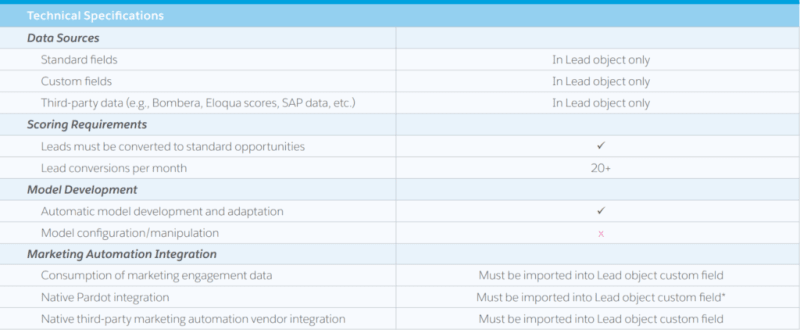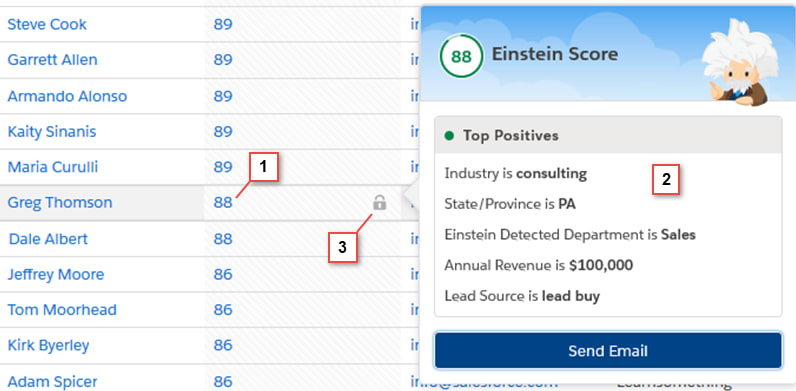Open the Power of AI for Superior Lead Management
How to sort leads effectively? It has always been a challenging task due to the difference in the values of each lead.
Traditional lead-scoring methods mainly use manual rules set by human selection. These methods have their benefits, allowing for a personal touch and experience-based decisions. However, they often miss several critical points. These overlooked details could significantly impact a lead’s overall quality and potential value.
Sales team members might select leads that are geographically closer to them, or perhaps those that fall within their target industry. In some cases, they may choose leads from larger, more established companies, assuming these to be more promising.
This approach, while intuitive, doesn’t always bring the best results. However, the introduction of Sales Cloud Einstein has brought a significant change to this process. It enables a more sophisticated, data-driven method for lead selection. This new system focuses not just on the basic characteristics of a lead but delves into the potential value of each lead. This smarter approach helps sales teams prioritize their efforts more effectively, targeting leads that are more likely to convert and as a result improving overall efficiency.
More information about how to get from Salesforce more insights can be found in Salesforce Einstein Review.
Image Source: Salesforce Blog
Einstein Score Salesforce: A Game-Changer for Sales Teams
Predictive Salesforce Einstein lead scoring applies AI technology to analyze a large amount of data. It considers various important factors. These include past interactions with potential customers, detailed demographic information, and patterns in how these leads behave. By doing this, it generates a more accurate score.
This score shows the possibility of a lead turning into a real customer. Such a detailed and precise scoring system helps your sales team. They can concentrate their efforts where they are most likely to succeed. This approach enhances the efficiency and effectiveness of their sales strategies.
Image Source: Salesforce News & Insights
Key Advantages:
- Improve how often you connect with and convert leads.
- Quickly engage with the best leads for faster results.
- Learn what affects lead scores to make smarter choices.
Image Source: Salesforce Technical Documentation, Einstein Lead Scoring
Main Features:
- Zero Setup – no need for complex implementations or transferring data to other tools.
- Custom Workflows Driven by Lead Scores – assign tasks easily based on predictive scores.
- Smart Lead Lists – quickly find and focus on the best leads.
Salesforce Einstein Lead Scoring Cost
Sales Cloud Einstein, including Salesforce Einstein Lead Scoring, is available in both Performance and Unlimited Editions. It’s also offered for an additional cost in the Enterprise Edition. The cost is $50 per User/Monthly.
Image Source: Salesforce Editions Pricing
For this price, you will get:
- Mobile and Desktop Apps
- Intelligent Sales Assistant
- Automatic Data Capture
- Lead and Salesforce Einstein Opportunity Scoring
- Opportunity and Account Insights (Einstein Opportunity Insights and Einstein Account Insights are scheduled for retirement as of Summer ’23 on November 14, 2023. After that date, Einstein Opportunity Insights and Einstein Account Insights aren’t available.) Source: Salesforce Help
- Predictive Forecasting
- Sales Analytics
Elevating Lead Scoring with Salesforce Einstein Analytics
Salesforce Einstein Analytics changes how we approach lead scoring by leveraging advanced machine learning techniques. It dives deep into a variety of data within Salesforce, analyzing the usual fields and custom ones tailored to specific business needs. Additionally, it tracks a wealth of activity data, including email interactions, social media engagements, and website visits.
The standout feature of Einstein Analytics is its dynamic learning ability. It continuously adapts and refines its analysis as it processes more data. This means that the predictions it makes become increasingly precise over time. For your sales team, this translates to a constantly improving set of insights. They’re not just working with static data, but with a system that evolves and offers more relevant, actionable information. This helps pinpoint the most promising leads with greater accuracy, ensuring that the sales efforts are targeted effectively and efficiently.
Implementing Einstein Lead Scoring: The Basics
Setting up Salesforce Einstein Analytics for lead scoring is not too hard and involves a few important steps.
First, you need good data. Make sure your data is clean and well-organized. The better your data, the better Einstein Analytics can guess which leads are good.
Next, think about what a good lead means for your business. This could be when a lead buys something, signs up for a trial, or does something else that shows they might buy soon. Knowing these actions helps Einstein know what to look for.
After your data is ready and you know what actions are important, you can start setting up Einstein Lead Scoring in Salesforce. This part is easy. Just follow the setup steps. These steps help you choose the right fields for Einstein to use when it gives scores to your leads.
Finally, put the Einstein Score where your sales team can see it. This means adding it to lead pages, lists, and reports in Salesforce. This way, your sales team can see how likely each lead is to buy. It helps them know which leads to talk to first.
When you or your team add the Einstein Score field to your list views, you can hover over a score (1) to see the main reasons (2) behind it. This helps sales reps focus on leads with higher scores, which are more likely to turn into opportunities. The lock symbol shows that the score can’t be changed, it’s read-only (3).
Going Beyond the Basics: Advanced Implementation
For those who want more, Salesforce’s ecosystem is rich with plugins and integrations. Advanced users can leverage the Einstein Prediction Builder to create custom AI models. These models can predict outcomes like customer lifetime value or the likelihood of a lead responding to a specific campaign. You can find all related Apps on the AppExchange marketplace. More information about Salesforce AppExchange can be found in the Salesforce Analytics App.
Insight:
While Einstein Lead Scoring is powerful, its success is based on accurate data and regular updates to scoring criteria. Sales teams should:
- Regularly review and adjust scoring parameters.
- Train their teams to understand and utilize lead scores effectively.
- Use Einstein’s insights in cooperation with human intuition for the best results.
FAQ on Salesforce AI Lead Scoring
- What is the future of lead scoring?
As machine learning (ML) algorithms become more efficient and effective, marketing teams can use these advanced algorithms for sophisticated lead scoring. This allows them to manage more complex datasets more effectively.
- How do I calculate the lead score in Salesforce?
Einstein Lead Scoring studies your past leads to figure out which new leads are similar to those that converted before. It usually scores your leads by looking at many lead fields. But, if your admin thinks a field isn’t important for lead quality, they can tell Einstein to leave that field out. This makes the scoring fit better with what your business needs.
- Is lead scoring effective?
Einstein Lead Scoring matches the right follow-up with each inquiry and helps marketing and sales teams see where a prospect is in the buying process. Setting up lead scores improves how well marketing and sales work together.
- What is Einstein lead scoring Salesforce?
In the Salesforce app, Lead Scores are accessible both in list views and on record detail pages. Einstein Lead Scoring uses data science and machine learning to analyze the patterns found in your business’s history of lead conversion. This analysis helps in predicting which of the current leads should be given priority. This feature allows for a more informed and strategic approach to managing leads, enhancing the efficiency of the sales process.
- How is lead score calculated?
When calculating lead scoring, it’s essential to start with the conversion rate as a baseline. This rate is calculated by dividing the number of new customers by the total number of leads generated by your team. For instance, if your team generates 350 leads and from these, you gain 50 new customers, then your conversion rate is 14%.
In Conclusion
Salesforce’s Einstein Lead Scoring changes the game in managing sales leads. Traditional methods, like selection based on location or industry, often miss the full picture. Einstein Lead Scoring, using AI, looks deeper. It checks past interactions, demographic info, and how leads behave. This gives a clearer score for each lead.
Einstein Analytics adds more by checking data from Salesforce, like emails and social media. As it gets more info, it gets better at predicting which leads will work out. This is great for sales teams. They get up-to-date insights to focus on the right leads.
Starting with Einstein Lead Scoring is easy. And for those who want more, there are extra tools in Salesforce, like Salesforce Einstein Prediction Builder. This flexibility has helped many businesses improve their sales.
Remember, the key to success with Einstein Lead Scoring is to keep your data accurate and use both AI insights and human selection. The future of lead scoring is bright, with machine learning playing a big role.
Einstein Lead Scoring is part of Sales Cloud Einstein, and it’s a paid feature. It helps sales teams be more strategic and efficient in their work. With a smart approach to scoring leads, teams can focus better and achieve more.
The post Maximizing Sales Efficiency with Einstein Lead Scoring in Salesforce first appeared on Salesforce Apps.

























